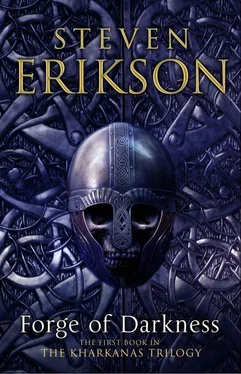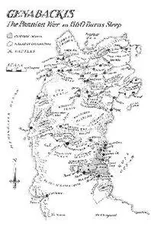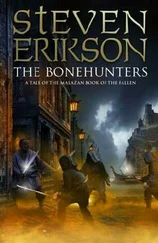Steven Erikson - Forge of Darkness
Здесь есть возможность читать онлайн «Steven Erikson - Forge of Darkness» весь текст электронной книги совершенно бесплатно (целиком полную версию без сокращений). В некоторых случаях можно слушать аудио, скачать через торрент в формате fb2 и присутствует краткое содержание. Жанр: Фэнтези, на английском языке. Описание произведения, (предисловие) а так же отзывы посетителей доступны на портале библиотеки ЛибКат.
- Название:Forge of Darkness
- Автор:
- Жанр:
- Год:неизвестен
- ISBN:нет данных
- Рейтинг книги:3 / 5. Голосов: 1
-
Избранное:Добавить в избранное
- Отзывы:
-
Ваша оценка:
- 60
- 1
- 2
- 3
- 4
- 5
Forge of Darkness: краткое содержание, описание и аннотация
Предлагаем к чтению аннотацию, описание, краткое содержание или предисловие (зависит от того, что написал сам автор книги «Forge of Darkness»). Если вы не нашли необходимую информацию о книге — напишите в комментариях, мы постараемся отыскать её.
Forge of Darkness — читать онлайн бесплатно полную книгу (весь текст) целиком
Ниже представлен текст книги, разбитый по страницам. Система сохранения места последней прочитанной страницы, позволяет с удобством читать онлайн бесплатно книгу «Forge of Darkness», без необходимости каждый раз заново искать на чём Вы остановились. Поставьте закладку, и сможете в любой момент перейти на страницу, на которой закончили чтение.
Интервал:
Закладка:
One of them squatted close now, in this narrow, rubbish-choked alley beside the tavern, crouching low in the pit below the four steps leading down to the cellar. It was softly laughing at all the excuses he had for being what he was, for doing what he did. Reasons and excuses weren’t the same thing. Reasons explained; excuses justified, but badly.
They’d sent her away — he’d seen the carriage, rolling down the centre street — and he’d caught a flash of her face behind the dirty window. He’d even shouted her name.
Galdan dragged closer the day’s jug of wine. He’d drunk more from it than he should have, and Gras didn’t like it when he had to give up another one too soon. One a day was the rule. But Galdan couldn’t help it. Sand was gone now, for ever gone, and all those nights when he weaved his way to the edge of the estate, like a reaver haunting a border, and fought against his desire to find her, take her away from this useless life — he would never make that journey again.
Of course, it hadn’t been her life that was useless, and that journey in the dark had been a sham, despite all the river stones he left in the hidden place only they knew about. She found them; he knew that much. Found them and took them somewhere, probably to the refuse heap behind the kitchen.
Galdan stared at the jug, at the filthy hand and the fingers twisted down into the ceramic ear. It was all like this wine — he would grasp it, only to have it disappear — the hand that only took could hold nothing for very long.
Proper men had two arms. With two arms they could do anything. They could keep the world just far enough away, and take only what they needed and it didn’t matter if it then vanished, because that’s how it was for everybody.
He’d been such a man once.
From the deep shadows at the bottom of the stairs, his stalker laughed on, and on. But then, everyone in the village laughed when they saw him, and in their faces he saw all his excuses, the ones he liked to call reasons, and those were good enough for him. And, it seemed, for everyone else, too.
Galar Baras knew that the Forulkan had believed themselves pure in their enmity towards disorder and chaos. Generations of their priests, their Assail, had devoted entire lives to the creation of rules of law and civil conduct, to the imposition of peace in the name of order. But to Galar’s mind they had taken hold of the sword from the wrong end. Peace did not serve order; order served peace, and when order became godlike, sacrosanct and inviolate, then the peace thus won became a prison, and those who sought their freedom became enemies to order, and in the elimination of such enemies, peace was lost.
He saw the logic to this, but it was a form of reasoning that surrendered its power when forced; as was the case with so many lines of reasoning. And arrayed against its simplicity was a virulent storm of emotional extremity, an array of vehemence, with fear wearing the crown.
The Forulkan Assail solution was order born of fear, a peace deemed for ever under assault, for ever threatened by malicious forces, many of which wore the face of strangers. There was, he had to acknowledge, a kind of perfection to their stance. Dissent could find no purchase, so quickly was it cut down, annihilated in a welter of violence. And being unknown, strangers always posed a threat to those serving fear.
Theirs was a civilization tempered on a cold anvil, and the Tiste had revealed the flaw in its forging. Galar Baras found it ironic that the great commander who had defeated the Forulkan was such an admirer of their civilization. For Galar himself, he could well see its seductive elements, but where Urusander had been drawn closer by them, Galar had recoiled in unease. What worth peace when it was maintained by threat?
It was only the fearful who knelt in worship before order, and Galar refused to live in fear.
Before the war, the south Borderswords had been a loosely organized, under-equipped force. Still, it had been the first to respond to the Forulkan invasion, the first to stagger the enemy. The cost had been horrendous, and yet Galar could still appreciate that the birth of what would come to be called the Hust Legion was found in the chaos and discord of battle. There had been no peace in that creation, and the first years of its life had been cruel and harsh.
Among the weaponsmiths of the Hust forges, there was a belief that every length of blade had a thread of fear in its heart. It could not be removed; indeed, it was bound to the life of the iron. They called it the Heartline of the Blade. Cut it and the weapon lost its fear of shattering. The forging of a weapon was devoted to strengthening that Heartline: every folding of metal twisted that thread, wound it tighter, until the thread knuckled, again and again — there were secret arts in this tempering, known only to the Hust weaponsmiths. Galar knew that they claimed to have discovered the essence of that thread of fear, the vein of chaos that gave a sword its strength. He could not doubt such claims, for the Hust had given that Heartline a voice, taut with madness or overflowing glee, a sound both wondrous and terrible, crying out through the quenched iron, and no two voices were the same, and those that sang loudest were known to be the most formidable of all weapons.
The Hust Forge began supplying the south Borderswords towards the end of the Forulkan War, but the enemy was already in disarray, broken in retreat and fleeing the relentless advance of Urusander’s Legion. Their numbers reduced by attrition, the Borderswords had been serving as veteran auxiliaries, and had participated in all the major engagements over the last two years of the war. They had been exhausted, on the verge of dissolution.
Galar still remembered the now-legendary day of the Hust Resupply, the huge wagons lumbering out of the dust clouds and the moaning and lowing that filled the air — sounds the battered troop of Borderswords believed were coming from the burdened oxen, only to discover that the terrible cries came not from beasts, but from the weapons nestled in their wooden crates. He recalled his own horror when he was summoned to exchange his blade, when he set down his worn, scarred sword and took in hand the new Hust weapon. It had shrieked at his touch, a deafening peal that seemed to drag talons down all the bones of his body.
It had been a son of Hust Henarald himself who had given him the weapon, and as the cry abruptly fell off, its echo a ringing clangour in Galar’s skull, the young weaponsmith had nodded and said, ‘Well pleased by your touch, captain, but be warned, this is a jealous sword — the most powerful ones are, we have found.’
Galar was unsure whether to thank the weaponsmith or not. Some gifts proved curses. Yet the weapon’s weight suited the strength of his arm, and in his grip it felt like an extension of his own bones, his own muscles.
‘There is no such thing,’ the weaponsmith went on, ‘as an unbreakable sword, though Abyss knows we have tried. Captain, listen well, for the words I now speak are known to only a few. We struggled in the wrong battle against the wrong enemy. All iron has limits to its flexibility, its endurance: these are true laws. I cannot guarantee that your new sword will not break, though it is of such power that no mortal blade is likely ever to shatter it edge to edge; nor could any swing or thrust you manage make the weapon fail you. Yet, should it ever break, captain, abandon not the sword. There are many knuckles in the Heartline, you see. Many.’
At the time he had known nothing about ‘knuckles’ or ‘Heartlines’. Such knowledge came later, when the secrets of the Hust swords became his obsession. He thought now that he understood the significance of these knuckles, and though he had yet to witness, or even hear of, a Hust sword breaking, he believed that a miracle was buried in each blade, an expression of sorcery unlike any other.
Читать дальшеИнтервал:
Закладка:
Похожие книги на «Forge of Darkness»
Представляем Вашему вниманию похожие книги на «Forge of Darkness» списком для выбора. Мы отобрали схожую по названию и смыслу литературу в надежде предоставить читателям больше вариантов отыскать новые, интересные, ещё непрочитанные произведения.
Обсуждение, отзывы о книге «Forge of Darkness» и просто собственные мнения читателей. Оставьте ваши комментарии, напишите, что Вы думаете о произведении, его смысле или главных героях. Укажите что конкретно понравилось, а что нет, и почему Вы так считаете.












